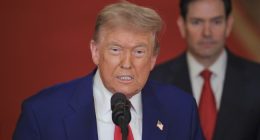Brazil’s President Luiz Inácio Lula da Silva has signed a bill restricting the use of smartphones at school, following a global trend for such limitations.
The move will impact students at elementary and high schools across the South American nation starting in February.
It provides a legal framework to ensure students only use such devices in cases of emergency and danger, for educational purposes, or if they have disabilities and require them.

“We cannot allow humanism to be replaced by algorithms,” Lula said in a closed ceremony at the presidential palace in the capital, Brasilia, adding that the bill “acknowledges the work of every serious person in education, everyone who wants to take care of children and teenagers in this country.”
In May, Fundacao Getulio Vargas, a leading think-tank and university, said Brazil had more smartphones than people, with 258 million devices for a population of 203 million Brazilians.
Local market researchers said last year that Brazilians spend 9 hours and 13 minutes per day on screens, one of the world’s highest figures.

Education Minister Camilo Santana told journalists that children are going online at early ages, making it harder for parents to keep track of what they do, and that restricting smartphones at school will help them.
The bill had rare support across the political spectrum, both from allies of leftist Lula and his far-right foe, former President Jair Bolsonaro.
Many parents and students also approved the move. A survey released in October by Brazilian pollster Datafolha said that almost two-thirds of respondents supported banning the use of smartphones by children and teenagers at schools.
More than three-quarters said those devices do more harm than good to their children.
“(Restricting cell phones) is tough, but necessary. It is useful for them to do searches for school, but to use it socially isn’t good,” said Ricardo Martins Ramos, 43, father of two girls and the owner of a hamburger restaurant in Rio de Janeiro.
“Kids will interact more.”
His 13-year-old daughter Isabela said her classmates struggled to focus during class because of their smartphones. She approved the move, but doesn’t see it as enough to improve the learning environment for everyone.

“When the teacher lets you use the cell phone, it is because he wants you to do searches,” she said.
“There’s still a lot of things that schools can’t solve, such as bullying and harassment.”
As of 2023, about two-thirds of Brazilian schools imposed some restriction on cellphone use, while 28 per cent banned them entirely, according to a survey released in August by the Brazilian Internet Steering Committee.
The Brazilian states of Rio de Janeiro, Maranhao and Goias have already passed local bills to ban such devices at schools. However, authorities have struggled to enforce these laws.
Authorities in Sao Paulo, the most populous state in Brazil, are discussing whether smartphones should be banned both in public and private schools.
Gabriele Alexandra Henriques Pinheiro, 25, works at a beauty parlour and is the mother of a boy diagnosed with autism spectrum disorder. She also agrees with the restrictions, but says adults will continue to be a bad example of smartphone use for children.
“It is tough,” she said. “I try to restrict the time my son watches any screens, but whenever I have a task to perform I have to use the smartphone to be able to do it all,” she said.
Institutions, governments, parents and others have for years associated smartphone use by children with bullying, suicidal ideation, anxiety and loss of concentration necessary for learning.
China moved last year to limit children’s use of smartphones, while France has in place a ban on smartphones in schools for kids aged six to 15.
Cell phone bans have gained traction across the United States, where eight states have passed laws or policies that ban or restrict cellphone use to try to curb student phone access and minimize distractions in classrooms.
An increasing number of parents across Europe who are concerned by evidence that smartphone use among young kids jeopardises their safety and mental health.
A report published in September by the United Nations Educational, Scientific and Cultural Organisation (UNESCO), said one in four countries has already restricted the use of such devices at schools.
Last year in a US Senate hearing, Meta CEO Mark Zuckerberg apologised to parents of children exploited, bullied or driven to self-harm via social media. He also noted Meta’s continued investments in “industrywide” efforts to protect children.




